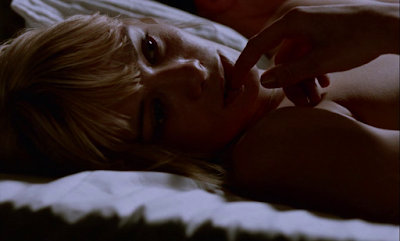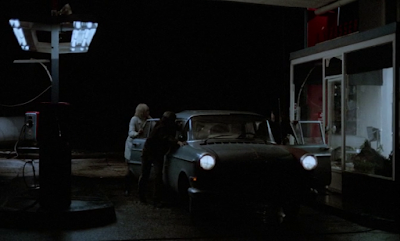Alemán | Subs:Castellano/English (muxed)
82 min | x264 672x576 ~> 960x576 | 2900 kb/s | 224 kb/s AC3 | 25 fps
1,79 GB
82 min | x264 672x576 ~> 960x576 | 2900 kb/s | 224 kb/s AC3 | 25 fps
1,79 GB
Asesinato y homicidio culposo*
La relación entre Hans y Marie está en ruinas. Cuando él decide dejarla
para siempre e insiste en acostarse con ella por última vez, ella toma
su pistola y aprieta el gatillo. Hans está muerto y su cuerpo sin vida
tiene que desaparecer lo más rápido posible. En un pub conoce al joven
mecánico Günther, a quien puede persuadir para que la ayude a sacar el
cuerpo. Junto con Fritz, el amigo de Günther, emprenden un viaje por
carretera al campo. En la euforia de la vida, el asesinato queda cada
vez más relegado a un segundo plano, pero el cadáver sigue ahí...
Una joven en una discusión mata a su novio, del que está a punto de
separarse. Contra el disparo en su corazón, ella lleva Alka Seltzer, con
las siguientes palabras: "¡Todo volverá a estar bien! Cuando se da
cuenta de que está muerto, ella misma se toma el analgésico y se duerme
sobre él. Luego sale a la calle a buscar a alguien que la ayude a
deshacerse del cuerpo. Jugar con el cuerpo es tan provocativo como
irrespetuoso. Se le pasa por encima, se le empuja, se le empaca, se le
expulsa, se le entierra. A veces sirve como adorno lateral, a veces como
almohada durante el sueño. Schlöndorff muestra entonces el funeral: la
vida es una tortura y la muerte un carnaval.
De manera extrema, Schlöndorff escenifica extractos, detalles que nunca apuntan a un todo, sino que presentan situaciones concretas en un entorno concreto. La imagen de una generación toma forma - más allá de la calma y la rebelión, la visión de una espontaneidad juvenil, una ecuanimidad casi existencialista. Por otro lado, la película es también una variante moderna de Schubert: "Ahí, donde no estás, está la felicidad.
De manera extrema, Schlöndorff escenifica extractos, detalles que nunca apuntan a un todo, sino que presentan situaciones concretas en un entorno concreto. La imagen de una generación toma forma - más allá de la calma y la rebelión, la visión de una espontaneidad juvenil, una ecuanimidad casi existencialista. Por otro lado, la película es también una variante moderna de Schubert: "Ahí, donde no estás, está la felicidad.
En resumen, esta película es poco más que un intento poco feliz de Schlöndorff de nouvellevaguear
en la Alemania de 1966. La traigo al blog como curiosidad, por la
participación de la legendaria Anita Pallenberg, y la música del no menos
legendario Brian Jones. Los subtítulos en castellano son de un servidor no tan legendario.
*La película nunca se estrenó en un país de habla hispana y por lo tanto
no tiene título comercial en castellano. Según mi poco conocimiento, Mord und Totschlag sería algo como en inglés Murder and Manslaughter, y le he dado un título parecido en castellano. También la podríamos llamar - siguiendo la tradición - La fuerza del olvido u otra pavada por el estilo.
Degree of Murder
The film opens up in Munich where Marie (Anita Pallenberg) has recently
broken up with her boyfriend and after trying to move on with her life
has hit a wall. Her failure to get on the other side, where in the past
she has frequently seen herself leading a happier life, has exhausted
her so much that all she wants now is peace and quiet to recover.
On a night when Marie could barely stand on her feet, however, her
agitated boyfriend returns to her apartment and they have a huge
argument, at the end of which she accidentally pulls the trigger of his
gun and kills him...
Marie does not panic. She leaves the apartment and then in a nearby bar
offers cash-strapped Gunther (Hans Peter Hallwachs) five hundred marks
to help her get rid of the body. At first the stranger turns down the
offer, but then changes his mind and they take a taxi to her place in
Harras. They relax for a few days, make love, and eventually decide to
go to work. But Gunther correctly predicts that they would need another
set of strong hands to carry the cold body down the stairs to their car,
which is why he asks his drinking buddy Fritz (Manfred Fischbeck) if he
would be willing to help in exchange for cash. When he agrees, they
remove the body from Marie's apartment and leave the city. The trio's
plan is to drive deep inside the countryside and then dispose of the
body at a remote location where no one would ever bother to look for it.
[...] Schlöndorff's film leaves the impression of a small-town German
hippie trying to be cool amongst the popular international boys. In
other words, it is a simple time capsule whose strongest asset was the
enthusiasm of its creator to make a statement that 'different' films can
flourish in Germany as well. This is something that is worth admiring,
though, particularly given the fact that Schlöndorff managed to make it
on a budget.
DVD rip & English subs by tomask











No hay comentarios.:
Publicar un comentario